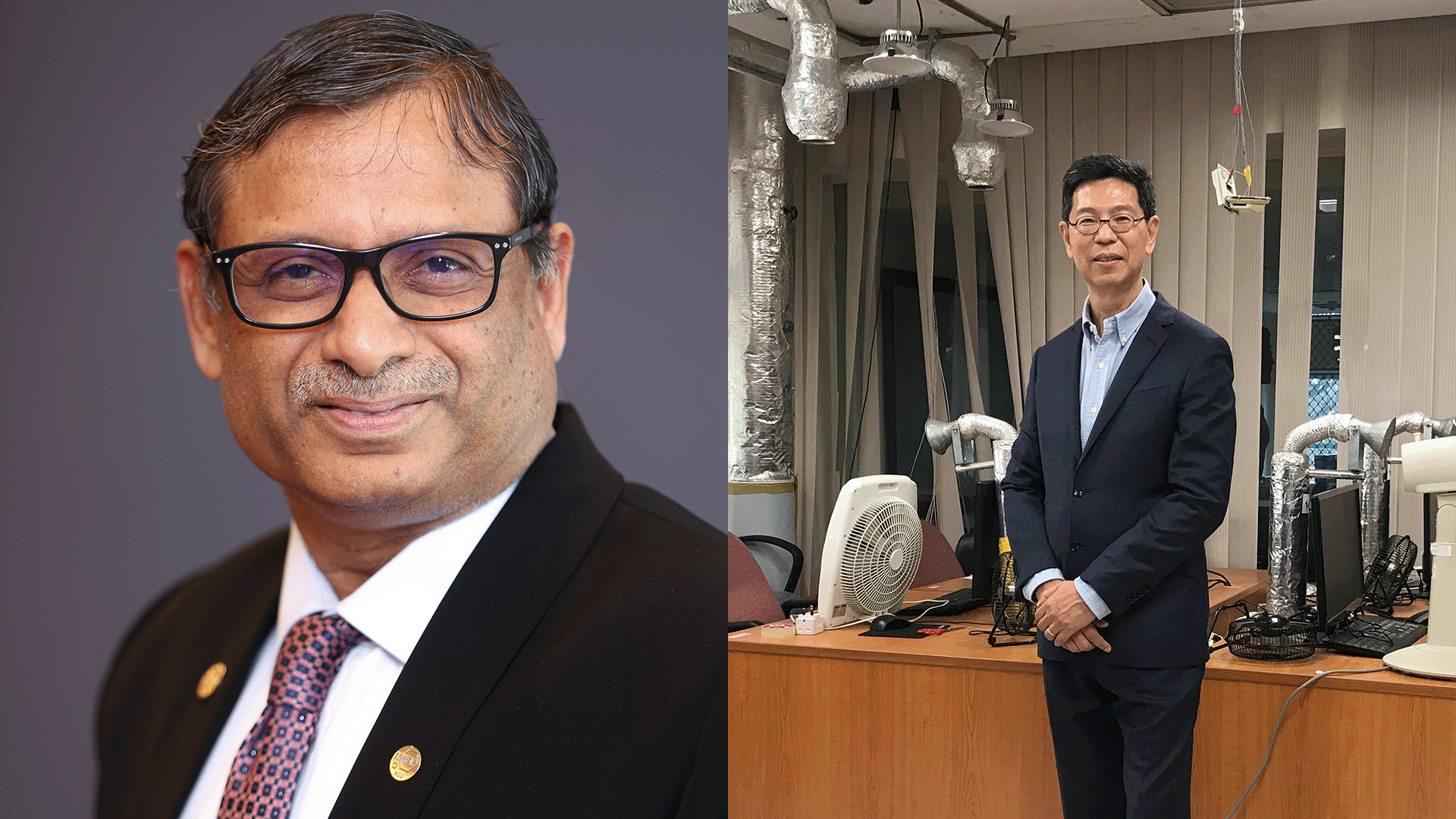
In a recent policy article published in the journal Science, Professor Chandra Sekhar and Associate Professor Tham Kwok Wai (both from the Department of the Built Environment) joined with more than 40 other scientists from around the world to call for urgent action to mandate indoor air quality standards in public buildings.
Despite people spending over 90 per cent of their time indoors, the authors argue that standards of indoor air quality (IAQ) is a fundamental yet frequently underestimated aspect of public health. The recent COVID-19 pandemic, they write, “has made all levels of society, from community members to decision-makers, realise the importance of IAQ for human health, wellbeing, productivity, and learning.”
In their policy article, the authors discussed the challenges of establishing and enforcing IAQ standards, including political, social, and technical barriers and they proposed practical solutions such as advanced sensors, effective ventilation strategies, and leveraging technology to improve IAQ.
In this Q&A, Prof Sekhar and Assoc Prof Tham discuss the potential public health and economic benefits of prioritising IAQ and what spurred their call for action:
Q: What inspired you and your co-authors to address indoor air quality and its legislation?
A: In late March 2020, as COVID-19 was spreading, a group of 36 scientists led by Professor Lidia Morawska from Queensland University of Technology in Brisbane, Australia, came together to push the World Health Organisation (WHO) to recognise airborne transmission of the virus. The scientists are experts in various fields like building science, aerosol science, physics, engineering, medicine, infectious diseases and microbiology. Our goal was to highlight the importance of airborne transmission of the virus that causes COVID-19 and advocate for preventive measures.
In our message to the WHO Director General, we stated: “Studies conducted by us and other scientists have demonstrated beyond any doubt that droplets exhaled by humans stay in the air for a sufficiently long time and travel sufficiently long distances to pose a real risk of transmitting infections… We are of the opinion that many infections can be prevented, and many lives can be saved, if the risk of airborne transmission of COVID-19 is communicated and measures are taken to mitigate it.”
After a year of continuous engagement, the WHO acknowledged the possibility of airborne transmission in April 2021. This recognition was a major turning point, emphasising the need for better IAQ standards.
Q: How do you envision the implementation of IAQ standards in different urban environments across various countries?
A: Ventilation and IAQ standards have existed for decades in many countries, including North America, Europe, Asia, and Australia. However, there's often a gap between design and actual implementation.
In our Science article, we emphasise that for IAQ standards to be practical, they must be feasible and consistently applied. Buildings should be designed, constructed, maintained, operated, or retrofitted to meet these standards – which in turn should be tailored to their specific use. Compliance should be checked at the building's completion and regularly throughout its life. These standards need to be technically feasible, affordable, and balanced with other priorities like energy use as well as being specific to the local context and challenges. Only then can we ensure healthier indoor environments worldwide.

Q: What do you see as the most pressing priorities for improving IAQ?
A: The most pressing priorities are:
- Raising Awareness: It's crucial to educate building owners, designers, and users about the importance of IAQ. This includes all enclosed environments like aircraft, trains, buses, and cars.
- Resilient Design and Operation: We need to design and operate resilient and sustainable buildings with advanced HVAC (heating, ventilation, and air conditioning) systems that enhance IAQ. This involves integrating IAQ considerations into every stage of building design and maintenance.
- Risk Mitigation: Reducing the risk of haze and pandemic outbreaks in buildings and other enclosed environments is essential. Effective IAQ measures can significantly mitigate these risks, protecting the health and well-being of occupants.
- Improving well-being, productivity and quality of life: We need to create and sustain optimal conditions for all aspects of living, working and recreation to enhance the contribution of the built environment towards a better world.
By focusing on these priorities, we can create healthier indoor environments and better prepare for future challenges.
Q: How does your research at CDE address IAQ challenges?
A: Our research at CDE focuses on creating energy-efficient, healthy buildings. Professor Chandra Sekhar, Associate Professor Tham Kwok Wai, and Associate Professor David Cheong (all from the Department of the Built Environment), who founded the Indoor Air Quality Research Unit at NUS in the early 90s, have been at the forefront of this effort.
Our team has made significant strides in improving HVAC systems and devices to enhance comfort, well-being, health, and productivity in tropical buildings. We emphasise energy efficiency and sustainability, aiming to balance these with optimal indoor air quality. Our collaborative research continues to contribute valuable insights into how we can create healthier indoor environments while maintaining energy efficiency.
For example, we invented the Single Coil Twin Fan (SCTF) system that synergistically meets thermal and ventilation requirements through the same cooling coil operating with two independently controlled fans. This way the right amount of cooling, dehumidification and ventilation is provided all the time. We’ve also developed air terminal devices that provide the “last mile” adjustment to meet individual preferences whilst optimising the background conditions for general energy conservation.
Q: What role do you see technology playing in monitoring and improving IAQ in the future?
A: Technology, especially IoT sensors, will be key in monitoring and improving indoor air quality (IAQ). These sensors keep an eye on things like temperature, humidity, CO2 levels, and particulate matter (PM2.5), giving us real-time data on IAQ.
These sensors also collect historical data, which helps us analyse air quality trends and display this information over time. This data is easily accessible to everyone—from building occupants to facilities managers—via smartphone apps that provide instant updates on IAQ. This continuous monitoring allows for quick interventions and better decision-making, ensuring healthier indoor environments.
Additionally, data analytics enables us to customise individual workspaces, which is becoming increasingly important with the rise of co-working spaces. With "last mile" technologies, we can create smart workplaces tailored to each person’s preferences, regardless of where or when they are working.
Moreover, digital twin technology can help create optimal indoor environments by considering factors like occupancy, function, and changing weather conditions. This dynamic approach ensures that indoor spaces are always at their best, regardless of external influences.
Q: How do you anticipate the field of IAQ research evolving in the coming years, and what implications might this have for public policy?
A: The COVID-19 pandemic has really put indoor air quality (IAQ) on everyone's radar. With most of us spending over 90% of our time indoors, it's become clear just how important good IAQ is. This has driven a lot of research into how aerosols spread and how air quality affects our health.
Looking ahead, climate change and rising temperatures add another layer of complexity. We need to improve IAQ while also being mindful of energy efficiency. As we learn more about how to balance these factors, we expect this knowledge to influence public policy significantly.
Our recent article in Science calls for mandatory IAQ standards in public buildings. If some countries lead the way and implement these standards, it could set a global precedent, leading to better IAQ and improved public health worldwide.





